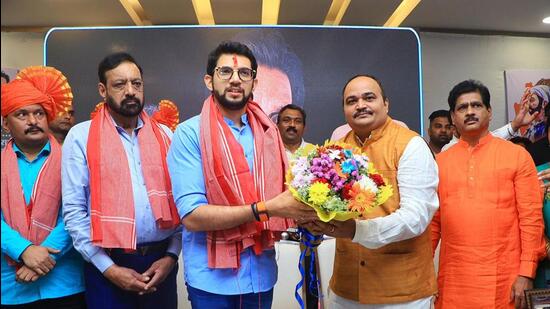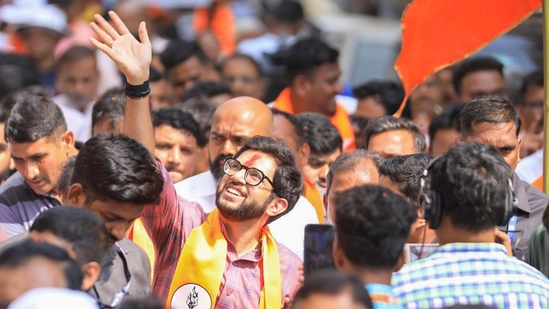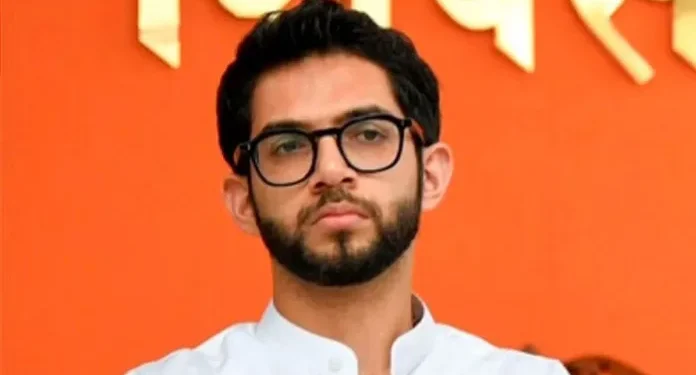Shiv Sena (UBT) leader halts Marathi language classes for non-Marathi speakers citing low enrollment and poor response from participants.

Mumbai: In April, as the Maharashtra Navnirman Sena (MNS) resorted to muscle-flexing—this time by attacking individuals for not speaking Marathi, following its poor performance in the 2024 Lok Sabha and Maharashtra assembly elections—Shiv Sena (UBT) leader Anand Dubey proposed a new idea.
To prevent the MNS from overshadowing the Shiv Sena (UBT)’s Marathi agenda, the 44-year-old leader announced plans to launch a free Marathi language course aimed at helping newcomers to Mumbai learn the language.
According to Dubey, the course initially sparked a lot of interest, attracting nearly 1,500 registrations. “We had selected two venues in Kandivali and a third in Malad for the classes, with plans to expand further,” he noted. The first batch started in mid-April in Kandivali, a suburb known for its large north Indian community, with about 50 students enrolled.
But despite the promising start, Dubey’s initiative soon ran into a familiar urban challenge: long commute times, worsened by Mumbai’s inadequate public transport and poor road infrastructure.
After the first week, attendance dropped to around 50%,” Dubey said. “Many participants mentioned that their work schedules and office commitments made it difficult to attend regularly. Several registrants also told us they would have been able to attend online sessions, but attending in person wasn’t feasible due to work and travel constraints.
The Marathi Agenda
It is deeply ironic that a party led by the son of the iconic Bal Thackeray now finds itself battling to prevent another political outfit from co-opting its pro-Marathi stance. The Shiv Sena, established in 1966 by Bal Thackeray, was born out of a mission to champion the rights of Marathi-speaking people in Maharashtra. At its heart, the party stood for the upliftment and empowerment of the Marathi manoos—the sons of the soil.

This agenda struck a chord with many Marathi-speaking voters in Maharashtra, particularly in Mumbai, where the Shiv Sena gained control of the Brihanmumbai Municipal Corporation (BMC) in 1985. Since then, the party has consistently retained its hold over India’s wealthiest civic body.
When Chhagan Bhujbal, then a Shiv Sena leader, became the mayor of Mumbai, he introduced the slogan “Sundar Mumbai, Marathi Mumbai” (Beautiful Mumbai, Marathi Mumbai). It reflected a vision to shape the cosmopolitan city—with its diverse population—into one that celebrated its Marathi identity. Over the past four decades, the Shiv Sena has repeatedly emphasized this theme of asserting Mumbai’s Marathi character.
In March 2025, the issue resurfaced in political discourse after Rashtriya Swayamsevak Sangh (RSS) leader Bhaiyyaji Joshi stated that Mumbai does not have a single dominant language and that newcomers to the city are not obligated to learn Marathi.
His comments sparked controversy, drawing sharp criticism from both the Shiv Sena (UBT) and the Maharashtra Navnirman Sena (MNS), who used the remarks to attack the RSS and its political ally, the Bharatiya Janata Party (BJP).
At his Gudhi Padwa rally on March 30 at Shivaji Park, Maharashtra Navnirman Sena (MNS) chief Raj Thackeray delivered a passionate speech stressing the significance of the Marathi language and regional identity. He stated that anyone claiming they cannot speak Marathi in Mumbai “deserves a slap in the face.” Following the rally, several incidents were reported in which MNS workers allegedly assaulted individuals—including bank and supermarket employees—for not speaking Marathi.
Since its formation in 2006, the Maharashtra Navnirman Sena (MNS) has been known for its aggressive rhetoric and violent actions, particularly targeting north Indian, Hindi-speaking migrants—the second-largest linguistic group in Mumbai after Marathi speakers.
Against this backdrop, Dubey, who was born in Varanasi and moved to Mumbai with his family at the age of four, launched a free, month-long Marathi language course aimed at non-Marathi speakers.
Dubey, who began his political career with the Congress before switching to the Shiv Sena in 2019, encouraged non-Marathi speakers to enroll in a Marathi language course. He put up hoardings in Kandivali with the message: “Don’t be afraid. Let’s speak Marathi. Let’s respect Marathi.” On social media, he criticized the MNS for attacking non-Marathi speakers over their lack of language skills while failing to offer any support to help them learn.
Dubey’s initiative came at a strategically important time, with the BMC elections—set to be held for the first time since 2017—expected after the monsoon. With the Shiv Sena splitting in 2022 and suffering a setback in the 2024 assembly polls, the upcoming civic elections are crucial for the Shiv Sena (UBT). Party leader Uddhav Thackeray is particularly focused on gaining the support of Mumbai’s north Indian population.
Table of Contents
To that end, Dubey launched a Marathi-speaking course in Kandivali, his home base. He brought on board former schoolteachers experienced in teaching Marathi. The program received an encouraging response early on, with around 1,500 people signing up. Classes began in the third week of April, starting with an initial batch of around 50 participants. Most attendees were north Indians—shopkeepers, auto and taxi drivers, salesmen, private-sector employees, and even a few highly educated engineers.
Attendance began to decline after the first week, as many participants found it challenging to attend the sessions in person. Some dropped out midway, heading to their hometowns for summer vacations, according to Dubey. Consequently, the organizers were unable to launch the second batch of the course.
Gulab Maurya, 42, a private sector employee from Dahisar who participated in the first batch, described it as a beneficial initiative. “Rahul Jadhav, our instructor, taught us communication skills in Marathi. He started by highlighting the similarities between Hindi and Marathi, and then introduced us to useful words and phrases for everyday situations,” Maurya said. “However, attendance declined after the first week—some participants left for vacations, while others had work commitments. By the end of the month, around 25 of us completed the course. It gave me the confidence to speak basic Marathi at work and in public.”
However, MNS’s Mumbai president, Sandeep Deshpande, dismissed the initiative, calling it a mere political gimmick by Dubey. “Those who genuinely want to learn Marathi find their own ways — they don’t need Dubey’s classes,” he said.
Whether Deshpande’s stance would change if the long-estranged cousins, Raj and Uddhav Thackeray, were to reconcile after nearly two decades — a possibility that has sparked growing speculation in recent months — remains uncertain.
READ ALSO…..Raj Thackeray Meets CM Fadnavis in Mumbai Amid Buzz of Uddhav Reconciliation 2025















 Categories
Categories









